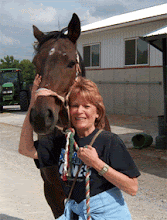The HSUS Urges Congress to Ban Export of U.S. Horses to Slaughter
Canadian undercover video shows horses conscious as they are shot multiple times
New undercover video footage released Tuesday by the Canadian Horse Defence Coalition confirms the horrible abuses inherent in the slaughter of our horses for human consumption, and illustrates the need for the U.S. Congress to bar the export of tens of thousands of U.S. horses each year to slaughter plants across the border. At the Bouvry Exports plant in Canada, a chestnut horse is shot three times while a gray mare waits in the kill box. As the chestnut horse panics and struggles—as horses are biologically wired to do—the gray mare is shot. She remains alive and kicking even as two more .22-caliber shots are fired at her face. She languishes. The pattern repeats itself.The CHDC's video footage, titled "Chamber of Carnage," further demonstrates what The Humane Society of the United States has documented for years about horse slaughter: Foreign-owned horse slaughterhouses have set up shop just over the border, and U.S. horses will continue to suffer both during long-distance shipping and then during a gruesome butchering process—all for the culinary whims of foreign gourmands.
To see the "Chamber of Carnage" video, click here. Some horses in the CHDC footage bear tags from the United States Department of Agriculture, indicating animals shown in the video originated in the United States.
"Every day while Congress delays, 'killer buyers' are transporting American horses to Canada and Mexico, and there the animals are meeting an awful demise, often after a painful and harrowing journey," said Wayne Pacelle, The HSUS' president and CEO. "This new investigation affirms again that there is unmistakable cruelty in this industry and it will only end when the Congress passes the Prevention of Equine Cruelty Act."
The footage is consistent with similar footage obtained by The HSUS of horses cruelly butchered in foreign-owned plants on U.S. soil as well as that of horse slaughter in Mexico. One theme runs through every investigation – U.S. horses are generally not raised for food and where this trade occurs, there is inherent abuse.
Horse slaughter is not a form of humane euthanasia – something The Canadian Horse Defence Coalition's video clearly shows. Horses are trusting, majestic creatures, and extreme flight animals. They fight or try to flee, and they suffer in these slaughter houses. Approximately 100,000 U.S. horses are purchased by "kill buyers" at auctions across the United States, who frequently outbid good horse owners to secure the fattest, healthiest horses, and are then transported cross-country often with no food, water or rest to slaughter plants in Canada and Mexico, where they are butchered. Despite Canada's regulations and inspection standards for plants that process horses, this investigation shows how ineffective they are at preventing suffering.
Nicholas H. Dodman, D.V.M., one of the world's most noted and celebrated veterinary behaviorists, a founding member of Veterinarians for Equine Welfare, and Tufts University School of Veterinary Medicine professor, reviewed the videos for The HSUS and echoed the same sentiment: "Noise, blood and suffering is what you get at the Bouvry equine slaughter plant: Horses kicking after they have been shot, sinking down and rising up; sometimes periods of struggling or paddling before a second or third shot has to be administered. This atrocity goes against all veterinary guidelines for humane euthanasia. Terror and suffering is the rule at this equine house of horrors ... and all in the name of the gourmet meat market."
The HSUS joins CHDC and hundreds of other horse industry and animal welfare groups in calling for the immediate passage of H.R. 503/S. 727 to prevent our horses from the cruelty of horse slaughter for human consumption. This legislation, authored by Reps. John Conyers, D-Mich., and Dan Burton, R-Ind., and Sens. Mary Landrieu, D-La., and John Ensign, R-Nev., has 181 House cosponsors and 29 Senate cosponsors.
-30-






No comments:
Post a Comment